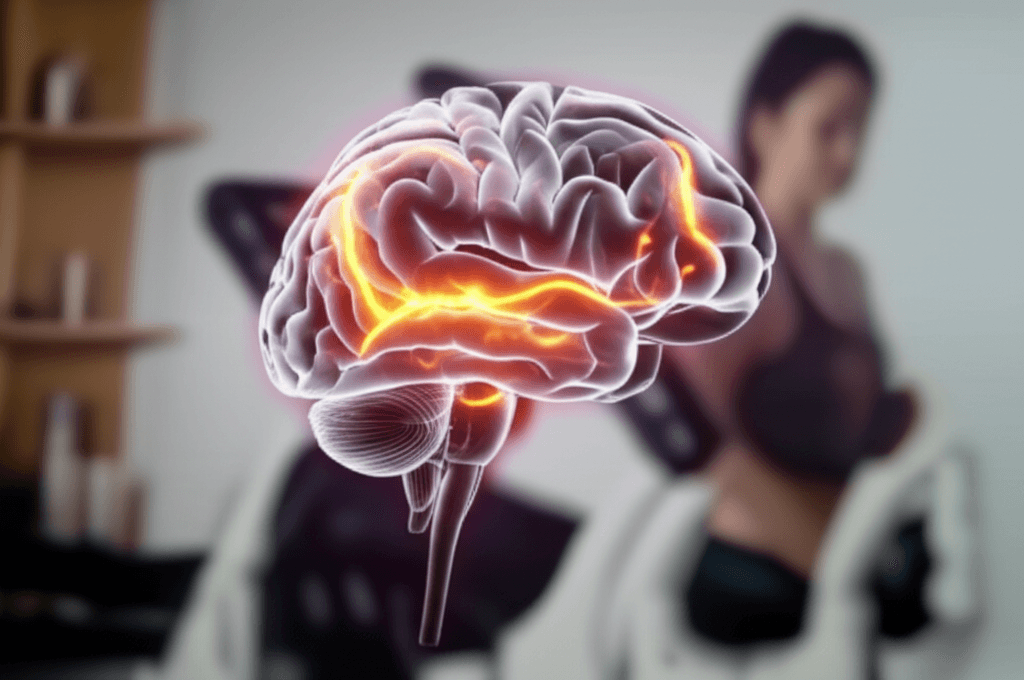In a world increasingly grappling with widespread mental health challenges, from pervasive anxiety to debilitating depression, many are seeking effective and sustainable solutions. While pharmaceutical interventions have long been a cornerstone of treatment, new research is shining a powerful spotlight on an accessible, side-effect-free alternative: exercise. A groundbreaking meta-analysis suggests that physical activity may not only be as effective as, but in some cases, even more effective than traditional pharmacotherapy and psychotherapy in reducing symptoms of mental health disorders, fundamentally reshaping our understanding of the “best” prescription for well-being.

The Groundbreaking Research: What the Study Revealed
Recent comprehensive analyses of decades of research are underscoring the profound impact of physical activity on mental health. A 2023 meta-analysis published in the British Journal of Sports Medicine, which analyzed data from 128,119 participants across multiple studies, reached a significant conclusion: physical activity can be more effective in reducing symptoms of depression than either counseling or common antidepressant medications. Another large analysis of meta-studies found exercise to be 1.5 times more effective at reducing mild-to-moderate symptoms of depression, psychological stress, and anxiety than medication or cognitive behavior therapy.
Key Findings and Methodologies
The 2023 British Journal of Sports Medicine study and other similar analyses found that various forms of physical activity, particularly moderate to high-intensity exercise, delivered robust improvements in mental health. The analysis of over 1,000 peer-reviewed studies published between 1990 and 2022 by the John W. Brick Mental Health Foundation also provides robust evidence that physical activity positively influences mental health, with over 89% of studies showing a statistically significant, positive relationship between the two.
Specific types of exercise that showed significant benefits included walking or jogging, yoga, and strength training. While all types of exercise were found to be beneficial, higher-intensity activities generally produced the strongest benefits.
Comparing Efficacy: Exercise vs. Traditional Pharmacotherapy
When directly comparing exercise to antidepressants, some studies suggest a comparable effect in treating non-severe depression. A 2022 network meta-analysis of randomized controlled trials found no significant difference in reducing depressive symptoms between exercise and pharmacological interventions for adults with non-severe depression. However, some researchers also noted that exercise appeared numerically larger in effect than SSRIs in certain instances, though more head-to-head studies are needed for definitive conclusions. Physical activity interventions produced a median reduction in mental health issues ranging from 42% to 60%, compared to a smaller improvement (22% to 37%) observed with psychotherapy and pharmacotherapy.
The effectiveness of exercise holds across different populations, including individuals with depression, HIV and kidney disease, pregnant and postpartum women, and otherwise healthy adults. This suggests that exercise should be considered a core component and even a mainstay approach for managing depression and anxiety.

The Biological Basis: How Exercise Transforms the Brain
The profound mental health benefits of exercise are deeply rooted in complex biological and neurological mechanisms. Physical activity doesn’t just make you feel good; it actively rewires your brain and optimizes its chemistry.
Neurotransmitter Regulation: Serotonin, Dopamine, and Endorphins
One of the primary ways exercise improves mood is by influencing key neurotransmitters in the brain. Physical activity triggers the release of endorphins, often called the body’s natural “feel-good” chemicals, which can improve your sense of well-being and act as natural painkillers. These endorphins create a sense of euphoria and relaxation, often leading to a “runner’s high.”
Beyond endorphins, exercise also boosts the production and regulation of other vital neurotransmitters like serotonin and dopamine. Serotonin plays a crucial role in regulating mood, appetite, and sleep, while dopamine is involved in reward processing, motivation, and the brain’s pleasure system. Increased levels of these chemicals can directly combat depressive episodes and boost energy and alertness, mimicking the effects of some antidepressant medications.
Neurogenesis and Brain Structure
Exercise actively promotes neurogenesis, the process of creating new brain cells, particularly in the hippocampus. The hippocampus is a brain region critical for learning, memory, and emotional regulation, and its volume can be reduced by chronic stress and depression. Regular aerobic exercise can increase hippocampal volume, effectively reversing brain aging and enhancing resilience to stress.
Furthermore, exercise strengthens the prefrontal cortex, the brain’s “chief executive officer,” which is responsible for executive functions like planning, decision-making, and emotional regulation. It also promotes angiogenesis, the growth of new blood vessels in the brain, improving blood flow, oxygen, and nutrient delivery to brain cells, and enhancing communication between different brain regions, including those involved in emotional regulation.
Reducing Inflammation and Oxidative Stress
Chronic inflammation has been increasingly linked to the pathogenesis of various mental health problems, including depression. Exercise acts as a powerful anti-inflammatory agent. While initially, physical activity may temporarily raise inflammatory markers, regular exercise over time helps lower baseline cortisol levels and promotes the release of anti-inflammatory cytokines, reducing chronic inflammation in the body and brain. This reduction in inflammation can mitigate mental illness symptoms and improve overall mental health.

Beyond Biochemistry: The Holistic Benefits of Physical Activity
While the biochemical changes are significant, exercise offers a multitude of additional psychological and social benefits that contribute to improved mental well-being.
Psychological Resilience and Self-Efficacy
Achieving exercise goals, no matter how small, can significantly boost self-confidence and self-esteem. Regular physical activity can provide a sense of accomplishment and purpose, fostering psychological resilience and self-efficacy—the belief in one’s ability to succeed. This empowers individuals to feel more in control of their lives and better able to cope with challenges.
Social Connection and Community
Engaging in group exercise classes or sports can provide opportunities for social interaction and connection, helping to combat feelings of loneliness and isolation often associated with mental health conditions. Simply sharing a friendly smile or greeting during a walk can positively impact mood. Team sports, in particular, offer both physical and social benefits, aiding in the formation of friendships and breaking unhealthy routines.
Improved Sleep Quality
Stress and sleep disturbances frequently go hand-in-hand. Exercise promotes better sleep quality by regulating the body’s natural sleep-wake cycle. Adequate, quality sleep is crucial for mental and physical health, directly impacting mood and cognitive function.
Stress Reduction and Cortisol Regulation
Exercise is a highly effective stress buster. It provides a healthy outlet for pent-up tension and frustration, offering a distraction from negative thoughts. While exercise temporarily raises cortisol levels, regular physical activity helps lower baseline cortisol levels over time, improving the body’s ability to handle stressful situations. It helps regulate the hypothalamic-pituitary-adrenal (HPA) axis, the body’s central stress response system, making the brain more resilient to stress.

Integrating Exercise into Your Mental Health Regimen
Given the compelling evidence, incorporating regular physical activity into mental health treatment plans is not just beneficial, but increasingly viewed as a necessity.
Starting Small: Practical Tips for Beginners
For individuals struggling with mental health issues, low motivation and energy can be significant barriers to starting an exercise routine. The key is to start small and build gradually. Even short bursts of activity, like 10-minute walks, can be beneficial and accumulate to recommended weekly totals. The most important thing is to choose an activity you enjoy and feel comfortable with to ensure adherence.
- Begin with manageable goals: Aim for 10-15 minutes of activity a few times a week, gradually increasing duration and intensity.
- Find enjoyable activities: Whether it’s walking, dancing, gardening, yoga, or team sports, choose something that brings you pleasure.
- Integrate movement into daily life: Take the stairs, park further away, or walk during phone calls.
- Focus on consistency over intensity initially: Regularity is more important than strenuous workouts when starting.
Choosing the Right Exercise: Aerobic, Strength, and Mind-Body Practices
All forms of exercise offer mental health benefits, but some may be particularly effective.
- Aerobic Exercise (Cardio): Activities like running, swimming, cycling, brisk walking, or dancing are excellent for boosting endorphins, reducing stress hormones, and improving overall mood. A Harvard T.H. Chan School of Public Health study found that walking for an hour or running for 15 minutes a day can reduce the risk of major depression by 26%.
- Strength Training: Lifting weights or engaging in bodyweight exercises can build physical strength, improve self-esteem, and enhance body image. It has been shown to be effective for both depression and anxiety.
- Mind-Body Practices: Yoga, Tai Chi, and Pilates combine physical postures with breath control and mindfulness, promoting mental clarity, reducing anxiety, and improving overall well-being. These practices can significantly reduce anxiety symptoms by improving heart rate variability and decreasing cortisol levels.
When to Consult a Professional: Combining Approaches Safely
While exercise is a powerful therapeutic tool, it should not be seen as a replacement for professional medical care, especially for moderate-to-severe mental health disorders. Instead, it’s often most effective when integrated as a powerful complement to medication and psychotherapy. Healthcare professionals, including psychiatrists and therapists, are increasingly recognizing and recommending exercise as part of a holistic treatment plan.

Addressing Common Concerns and Misconceptions
Despite the growing evidence, exercise remains an often-overlooked intervention in mental health care.
Exercise as a Standalone Treatment vs. Adjunct Therapy
For mild-to-moderate depression, physical activity can be as effective as antidepressants or psychological treatments like cognitive behavioral therapy. However, for more severe conditions, exercise acts as a valuable adjunct, enhancing the efficacy of medications and traditional therapy. It can also help combat side effects of certain psychiatric medications, such as weight gain.
Sustaining Motivation and Overcoming Barriers
Lack of motivation, particularly in individuals with depression, is a significant barrier. Strategies to sustain motivation include setting realistic goals, making exercise a regular habit, finding activities that are enjoyable, and potentially engaging in group activities for social support. Understanding the concrete, science-backed benefits can also serve as a powerful motivator.
The science is clear: movement is medicine. As research continues to unveil the intricate ways in which physical activity optimizes brain chemistry, promotes neurogenesis, and fosters psychological resilience, the gym is increasingly recognized as a vital component of mental health care. By embracing exercise as a core “prescription,” individuals can unlock a powerful, natural pathway to improved mood, reduced stress, and enhanced overall well-being, transforming their mental health from the inside out.







